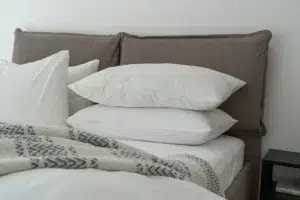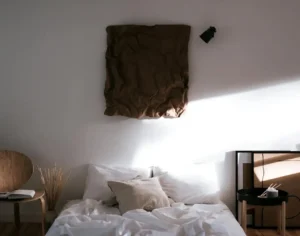When selecting bed sheets, it’s crucial to consider factors like material, thread count, and weave. The material impacts the feel and durability, while thread count indicates the quality. Weave influences breathability and overall comfort. Understanding these aspects helps in making an informed decision for a good night’s sleep.
Types of Bed Sheets

There are several types of bed sheets available, each with its own unique properties and benefits. Here are some of the most common types:
- Cotton: Cotton stands out as the top choice for bed sheets because of its breathability, soft feel, and long-lasting nature. There are various types of cotton used in making bed sheets, including Egyptian, Pima, Supima, Upland, and organic cotton. Each type differs in quality and price range.
- Linen: Linen, a natural fiber known for its breathability, is ideal for regulating temperature and enhancing sleep quality for individuals who experience both hot and cold sleeping conditions.
- Satin: Satin sheets, crafted from polyester or a polyester and nylon mix, boast a luxuriously smooth texture that is ideal for individuals with sensitive skin and allergies.
- Microfiber: Microfiber sheets, crafted from extremely fine fibers, offer a soft and lightweight feel while also being resistant to wrinkles. This makes them a perfect choice for households that are always on the go.
- Percale: Percale sheets, woven from a specific type of cotton, offer a crisp and cool feel that is highly breathable, ideal for those who tend to sleep hot.
- Sateen: Sateen sheets, distinct from percale due to their unique weave, boast a luxurious sheen and inherent resistance to wrinkles.
- Flannel: Ideal for those who prefer a snug and comforting sleep experience, flannel sheets are an excellent choice, particularly during the colder seasons.
- Silk: Silk sheets, renowned for their opulent texture and ability to regulate temperature, are considered a premium choice despite their high cost.
- Bamboo: Bamboo sheets, known for their eco-friendly nature and breathability, have become a favored option among individuals seeking sustainable bedding solutions.
- Fleece: For individuals who tend to feel cold while sleeping, fleece sheets provide a warm and cozy bedding option.
When selecting bed sheets, it’s important to factor in your personal comfort preferences, the local climate, and your willingness to maintain them. Certain materials, such as microfiber, might demand less upkeep but could lack breathability and durability compared to other options.
Key Factors to Consider

When buying bed sheets, it is important to consider a few crucial elements:
- Fiber Content: When selecting bed sheets, consider materials that align with your preferences and requirements. Cotton stands out as a favored option for its plush feel and reasonable cost. Alternatively, opt for superior cotton varieties such as Egyptian or Pima cotton, known for their enhanced softness and longevity.
- Thread Count: To ensure a good mix of softness and durability in your bed sheets, look for a thread count ranging from 300 to 500. Remember that while thread count can give you an idea of fabric density, it doesn’t always signify superior quality.
- Weave: When selecting bed sheets, take into account the type of weave they have, like percale for a crisp and light feel, or sateen for a silky smooth touch.
- Size and Fit: It is important to check that the bed sheets are suitable for your mattress by considering the thickness of the mattress and any extra items such as mattress toppers or pillows.
- Return Policy: Ensure to review the return policy before making a purchase, as it allows for the possibility of returning the sheets in case they do not align with your expectations.
- Texture and Feel: Opt for sheets that align with your comfort preferences, be it a luxurious silk-like smoothness or a warm and snug fleece feel.
- Allergen Protection: When selecting bed sheets, prioritize those with antimicrobial properties to prevent the growth of bacteria, mold, mildew, and dust mites for a hygienic and healthy sleeping space.
- Durability: Choose sheets crafted from sturdy materials and constructed with high-quality standards to reduce the frequency of replacements required.
- Environmental Impact: When shopping for bed sheets, opt for eco-friendly and organic options like organic cotton, hemp, or silk to support sustainability efforts.
- Care Requirements: It’s important to consider your lifestyle when choosing bed sheets, as certain types may need to be hand washed or dry cleaned exclusively.
To discover bed sheets that offer both comfort and cater to your individual preferences, it is essential to take these aspects into account.
How to Bed Sheets Maintenance?

Maintaining and caring for your bed sheets is crucial for ensuring they remain clean, fresh, and durable over time. Here are some key tips for bed sheet maintenance:
- Washing Instructions: Adhere to the care instructions provided on your bed sheet’s label to determine the appropriate washing procedure, such as water temperature, detergent selection, and cycle preferences.
- Pre-Treat Stains: To effectively address stains, it is recommended to promptly apply stain removers or a blend of mild detergent and water. When dealing with stains derived from proteins, it is advised to first immerse the impacted region in cold water prior to washing.
- Sun-Drying for Stubborn Stains: To naturally fade stubborn stains, consider sun-drying your bed sheets.
- Storage: It is important to make sure that your bed sheets are completely clean and dry before you store them. Store them in a cool, dry location, ideally in a fabric storage bag to avoid discoloration and moisture retention.
- General Care Tips: To prevent spills and stains, it is best to refrain from consuming food or beverages while on your bed.
- Replace Worn-out Sheets: Opt for premium bed sheets crafted from top-notch materials such as microfiber, renowned for their long-lasting quality and low-maintenance features.
- Choose Mild Detergent: Use a mild detergent suitable for your bedding fabric to avoid damaging the fibers.
- Optimal Water Temperature: To avoid fabric damage, adhere to the care label’s suggested water temperature when washing your bed sheets.
- Drying: To prevent shrinkage and preserve the fabric’s quality, it is recommended to dry your bed sheets using a low to medium heat setting.
- Frequency of Washing: To ensure your bed sheets remain clean and comfortable, it is recommended to launder them every one to two weeks or more often as needed.
Maintain the quality of your bed sheets with these guidelines to create a cozy and welcoming sleep space for you and your visitors.
Comparing Different Brands of Bed Sheets
When comparing different brands of bed sheets, consider the following factors:
- Material: Look for materials that suit your personal preferences and needs. Cotton is a popular choice due to its breathability and softness, while bamboo viscose is known for its moisture-wicking and thermal-regulating properties.
- Thread Count: Higher thread counts generally indicate a higher quality sheet, but this isn’t always the case. Aim for a thread count between 300 and 500 for a balance of softness and strength.
- Weave: Consider the weave, such as percale (crisp and light) or sateen (silky smooth).
- Fit: Ensure the sheets will fit your mattress, taking into account the depth of your mattress and any additional items like mattress toppers or pillows.
- Price: Consider your budget and seek out bed sheets that provide excellent value for their cost.
- Durability: Opt for high-quality bed sheets made from superior materials and excellent craftsmanship to minimize the need for frequent replacements.
- Care Requirements: Consider the care instructions for bed sheets as a crucial aspect of your selection process, taking into account the recommended washing and drying methods.
- Customer Reviews: When selecting bed sheets, it is important to review customer feedback in order to understand the quality and performance of the sheets.
- Sustainability: Opt for bed sheets made from organic or sustainable materials if you prefer environmentally friendly options.
- Return Policy: Before finalizing your purchase, it is crucial to carefully examine the return policy to verify the possibility of returning the bed sheets if they do not meet your standards.
Considering these elements will assist you in finding bed linens that offer both a luxurious texture and meet your specific needs and preferences.
Recomendation Best Sheets you can Buy
Factors to take into account when evaluating the cost and quality of bed sheets include the type of material, thread count, weave style, and maintenance instructions. Below is a breakdown of various bed sheet labels according to these criteria:
- Costco Kirkland Cotton Sheets: Crafted from pure cotton, these sheets boast a rich color palette to suit any taste. Renowned for their plush feel and long-lasting quality, they feature a thread count ranging from 300 to 500.
- Target Threshold Performance Cotton Sheets: Crafted from 100% cotton, these sheets boast a luxurious 400-thread count, offering a soft and welcoming feel. Priced at $60 for a king set, they provide both quality and comfort.
- Cariloha Bamboo Sheets: Crafted from 100% viscose bamboo, these sheets boast deep pockets that securely hug your mattress. With a luxurious thread count of 700, they are renowned for their exceptional softness. Despite their higher price point, ranging from $199 to $249 per set, these sheets offer unmatched quality and comfort.
- Mellanni Microfiber Sheets: Crafted from pure microfiber, these sheets boast a reputation for their luxurious softness, exceptional elasticity, and remarkable resistance to wrinkles. Available at a wallet-friendly price point, ranging from $27 for a twin set to $32 for a king set, they offer both quality and affordability.
- Luxome Luxury Sheets: Made from bamboo viscose, these bed sheets are known for their high quality, durability, and luxurious feel. With a sateen weave, they provide a silky smooth texture ideal for hot sleepers. Priced around $160, their breathability and lightweight design make them a worthwhile investment.
- Solid Performance Sheets from Target: Made from 100% cotton, these sheets are luxuriously soft with a thread count of 400, providing both comfort and durability. The king set is priced affordably at around $50.
- Empyrean Bedding Deep-Pocket Sheets: These sheets are designed to fit mattresses up to 21 inches tall, featuring elastic straps in all corners for a secure fit. Priced at $19, they offer affordability without compromising quality.
When it comes to selecting bed sheets, take into account your individual preferences, financial constraints, and the aforementioned factors. While pricier sheets may boast superior quality and longevity, more affordable alternatives can still deliver a cozy and welcoming night’s rest.
What thread count is best for bed sheets?
When choosing bed sheets, remember that a higher thread count doesn’t always mean better quality. Opt for a thread count between 200-800 for good quality. Consider the fabric type and personal preference when deciding on the best thread count for your needs.
What fabric is best for bed sheets?
When choosing bed sheets, consider your preferences and priorities. Cotton is breathable and durable, Egyptian cotton feels luxurious, linen is moisture-wicking, and microfiber is soft and low-maintenance. Choose based on what matters most to you: softness, breathability, or ease of care.
How do I choose the right size bed sheets?
To pick the correct bed sheets, know your mattress size (Twin, Full, Queen, King, California King) and its depth. Check if the sheets have deep pockets for thicker mattresses.
What are the different types of weaves for bed sheets?
Different types of weaves are used for bed sheets, each with unique qualities. Percale is a tight weave that feels crisp and cool. Sateen has a smooth, silky touch with a subtle sheen. Flannel is brushed for extra warmth and softness, perfect for colder months. Select a weave based on your desired texture, breathability, and warmth.
How do I care for my bed sheets to prolong their lifespan?
To extend your bed sheets’ lifespan, follow the manufacturer’s care instructions. Wash in cold water with mild detergent, avoid bleach and fabric softeners, and tumble dry.
I love sharing my knowledge about home living, especially in interior design, furniture selection, indoor plant care, and DIY ideas.








Tinggalkan komentar